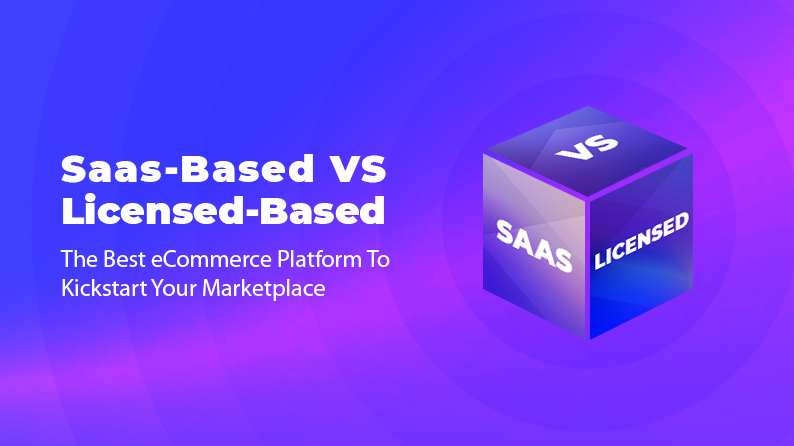SaaS vs Licensed Multi-vendor eCommerce Platforms | Which Is Right For Your Business?
Online shopping has become the new norm, blame it on Amazon, Social Media, or the Pandemic. In the U.S. alone, eCommerce sales are projected to exceed $1.3 trillion by 2025 as per the Statista, which is more than triple what they were less than a decade ago.
As a consequence, retailers are in a race to go digital in the hope of attracting new customers and securing more sales. If you are also willing to be in that race, there are high odds that you are in search of an eCommerce software.
Picking the software for your online business is not easy as there are multiple requirements that differentiate them from other websites. eCommerce platforms need to be more user-friendly, attract and convert more visitors, and support payment gateways. The platform should ensure security to build the trust of users. The platform also needs integrations for analytics, accounting, etc, to streamline business processes.
As a result, it becomes a daunting task to decide between the Saas and Licensed – based software to power your eCommerce business. To help you narrow the field, we have come up with detailed research on both types of software including their pros and cons to help you make the right decision.
But before that, you need to acquire an understanding of both the platforms, consequently which will eliminate a lot of uncertainty and make the choice a lot easier.
SaaS or Cloud-Based eCommerce Software
SaaS implies that instead of purchasing the software, you purchase it as a service. It is a license and delivery model in which software is licensed on a subscription basis. It is hosted by a third-party provider in the cloud enabling business owners to create and run an eCommerce business without worrying about the issues associated with website maintenance.
The monthly or yearly subscription fee will cover all the costs that your platform will accrue including hosting, creation, maintenance, and upkeep. The businesses running on SaaS do not have access to the source code and rely on the service provider to support the business with the necessary features and tools.
License Based or Standalone eCommerce Software
A License based eCommerce software, on the other hand, comes along with plenty of flexibility and customization options. It provides full access to its source code, allowing businesses to change, customize, and adapt it to their business needs. This brings a great deal of flexibility, which is especially important to growing businesses that require tailored solutions to fit their specific needs.
This software can save a lot of money as you do not have a monthly/yearly subscription for a lifetime. Just the one-time upfront cost of the software, and thatÔÇÖs it. Another major benefit of standalone software is it is relatively easy to scale. You can add more features and functionality to the website as your business grows.
Moreover, businesses can host the website on their own servers having complete control over the platform. To put it merely, license-based software is primarily acknowledged for its customizability, flexibility, and scalability.
Have an ecommerce project in mind?
SaaS Based VS License Based eCommerce Software
Since both eCommerce platforms offer unique solutions for building a reliable eCommerce marketplace successfully, evaluating these two platforms becomes a daunting task. Still, to help businesses make an informed decision, weÔÇÖve broken down key differences to differentiate both the software.
Customization & Scalability
License-based software support the highest customization and scalability features. Business owners do not need to rely on software providers and can easily customize the software tailored to the specific requirements. As a result, there is no limit to how you can handle customization and modify the design and development of your e-store.
Security, Maintenance, & Support
The most critical aspect that builds trust among customers is the security and PCI compliance of every eCommerce website as the eCommerce industry is the second most attacked industry in the world when it comes to cyberattacks. License-based software allows you to be committed to ensuring the security of the website.
Complete Control
License-based software allows you complete control of everything your marketplace can have including the design, backend process, and additional features. So if you are looking to make big changes and have very niche needs, this might be the way to get what you need. With time, you can introduce almost a new platform thatÔÇÖs entirely customized for your business and audience.
Have full control over your ecommerce Marketplace with our license-based ecommerce Software – Yo!Kart
Vendor Lock-In
Almost 65% of tech-focused companies in 2020 reported in a survey that they switched to license-based software to avoid vendor lock-ins. While some SaaS platforms may hinder users from making necessary changes and customizations to meet business requirements, license-based software frees users from these limitations. All your integrations, customizations, and even data are at risk of being lost and of course, your marketplace will go down the minute the vendor pulls the plug on the hosting.
Flexible Hosting
Server downtime can ruin everything for your business. So, make sure your businessÔÇÖs website is in safe hands. A great web hosting service, which is reliable, secure, and fast can ensure that the quality of service to your customers is the best in the market. You can choose your own hosting solution for an eCommerce website, built on license-based software.
It is recommended to research well before you decide on your hosting service provider.
Third-Party Integrations
For License-based eCommerce software, owners have the luxury to get custom integrations generated for the eCommerce marketplace to incorporate existing business systems/tools as seamlessly as possible. These tools may include ERP systems, order management systems, tax tools, shipping platforms, optimization tools, and many more.
Ownership Cost
This price typically includes the entire upfront cost for development, design, deployment, and the ongoing maintenance cost for the platform. Since the subscription fee for a SaaS-based platform is relatively lower than the upfront cost of a license-based software, many entrepreneurs recognize on-premise platforms as an expensive option.
But what these entrepreneurs donÔÇÖt consider are factors like software customization and scalability that can influence the total cost of their purchased software.
A License-based Whitelabel Software for Building an ecommerce Marketplace
Conclusion
Both Saas-based and license-based eCommerce software have a significant market share with a large number of devoted customers who prefer one over the other. But, the dynamics of the eCommerce marketplace are changing with the emergence of new trends and technologies. SaaS-based eCommerce platforms are more suited for small-scale online stores.
To start a feature-rich and robust eCommerce marketplace like Amazon or Etsy, you need a platform that offers more control, flexibility, and scalability. This is where license-based multi-vendor software like Yo!Kart comes in handy. With Yo!Kart, enterprises can enjoy a self-hosted multi-vendor marketplace tailored to meet their business requirements.
Our Yo!Kart team delivers exceptional marketplace solutions in both B2B and B2C segments with an endless array of customizations. Experience our feature-rich platform through the live demo.
FAQs
Q1. Which are the most popular SaaS eCommerce multi-vendor platforms?
Shopify, BigCommerce, and Volusion are some of the most popular Saas-based software that utilize plugins to convert an eCommerce marketplace into a multi-vendor marketplace. However, these software come with monthly/annual recurring subscription costs making the cumulative cost quite overwhelming.
Q2. Which are the most popular Licensed eCommerce multi-vendor platforms?
Yo!Kart, CS-Cart, or Growcer form the list of the most promising and reliable license-based or on-premises multi-vendor software. These come with one-time upfront costs and lifetime ownership of the software.
Q3. Do License based software offer to host?
No, license-based software do not offer hosting to comply with the security standards of businesses and not compromise the privacy and security of the platform.
Q4. Do License based software provide source code?
Yes, license-based software like Yo!Kart provide complete ownership of the source code (except framework) with every license, giving you the freedom to customize your online marketplace any which way you want to.
Q5. Which eCommerce software is more scalable? SaaS or Licensed based?
License-based eCommerce software are more scalable as business owners can easily customize the software tailored to the specific requirements to accommodate the growing needs of the business.



